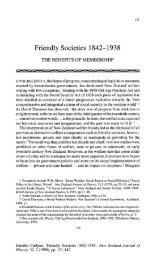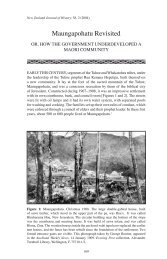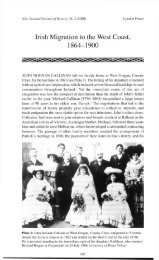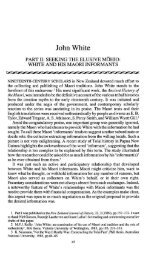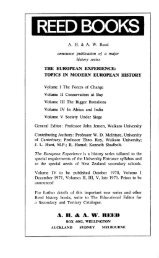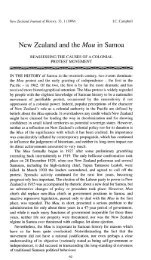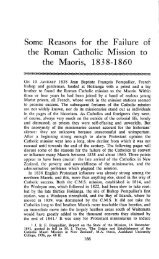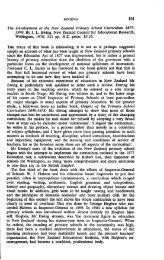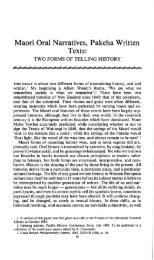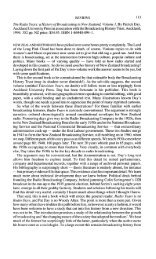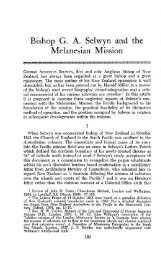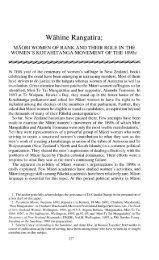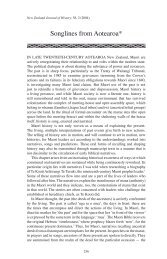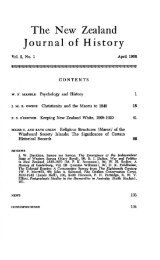The Purity of Historical Method
The Purity of Historical Method
The Purity of Historical Method
Create successful ePaper yourself
Turn your PDF publications into a flip-book with our unique Google optimized e-Paper software.
<strong>The</strong> <strong>Purity</strong> <strong>of</strong> <strong>Historical</strong> <strong>Method</strong><br />
SOME SCEPTICAL REFLECTIONS ON THE<br />
CURRENT ENTHUSIASM FOR THE HISTORY<br />
OF NON-EUROPEAN SOCIETIES<br />
ONE <strong>of</strong> the most striking differences — perhaps the most striking<br />
difference — between the history syllabuses <strong>of</strong> the forties and the<br />
history syllabuses <strong>of</strong> the sixties in our universities is the appearance<br />
<strong>of</strong> numerous courses on non-European history. This re-orientation<br />
was brought about very sensibly by the break up <strong>of</strong> colonial empires<br />
and the emergence <strong>of</strong> the many new independent nations in both<br />
Africa and Asia. It is not only a tribute and a mark <strong>of</strong> respect to our<br />
new independent fellow-citizens but also a sign <strong>of</strong> prudence. If we<br />
can no longer control and guide the destiny <strong>of</strong> the inhabitants <strong>of</strong><br />
Asia and Africa, we ought to take cognizance <strong>of</strong> their history, their<br />
institutions and customs so as to be able to form some estimate as<br />
to what we might expect from them and how we ought to behave<br />
towards them. <strong>The</strong> re-orientation was prompted by courtesy as well<br />
as by prudence and it would seem that there is absolutely nothing<br />
to be said against it and everything to be said for it.<br />
Nevertheless, on second thought, it is bound to raise grave doubts.<br />
<strong>The</strong> re-orientation is based on the simple and unsophisticated notion<br />
that the study <strong>of</strong> history is a completely neutral method <strong>of</strong> inquiry.<br />
It is a way <strong>of</strong> recording the past; and since everything that happens,<br />
happens in time, everything must have a past which can be recorded.<br />
We are, <strong>of</strong> course, aware that our ability to record the past depends<br />
on the availability <strong>of</strong> source material and we know that in many<br />
regions and in many centuries there is not much source material. But<br />
this is equally true <strong>of</strong> many parts <strong>of</strong> European history. It is a disability;<br />
but not one which has ever prevented the study <strong>of</strong> history.<br />
It merely means that some periods and topics can be studied more<br />
easily and more fully than others.<br />
On a more sophisticated review <strong>of</strong> the question, one must, however,<br />
pause and reflect that the study <strong>of</strong> history can by no means<br />
be simply equated with the recording <strong>of</strong> events as they succeed one<br />
another in time. <strong>The</strong> composition <strong>of</strong> a historical narrative is a highly<br />
selective activity. Most facts, whether recorded or not, are always<br />
left out. <strong>The</strong> writing <strong>of</strong> history is therefore anything but a purely<br />
1
2 PETER MUNZ<br />
passive recording <strong>of</strong> events as they succeed one another in time. It<br />
is based first <strong>of</strong> all on a criterion <strong>of</strong> selection. History is therefore<br />
not an empirical record <strong>of</strong> the past and we must therefore conclude<br />
that it is wrong to assume that we can write and study the history<br />
<strong>of</strong> any people simply because all people must, <strong>of</strong> necessity, have a<br />
past. Thus we are forced to the somewhat paradoxical conclusion<br />
that, while it is undeniable that everything and everybody has a<br />
history (i.e. a past or a time-dimension) it is equally undeniable that<br />
only in very special cases can the past be studied and recounted as<br />
history. As a result <strong>of</strong> this conclusion the re-orientation <strong>of</strong> our<br />
historical interests to Africa and Asia, let alone to the islands <strong>of</strong> the<br />
Pacific, appears highly questionable. If we turn to these parts <strong>of</strong> the<br />
earth and study their history, we are in fact applying a method <strong>of</strong><br />
study, i.e., we are using a criterion <strong>of</strong> selection, which is not necessarily<br />
indigenous to the people or areas we are studying. <strong>The</strong>refore,<br />
far from being either courteous or prudent, we are grossly arrogant<br />
and imprudent in that we are foisting upon these people an idea <strong>of</strong><br />
their past which is assimilated to our own idea <strong>of</strong> our past.<br />
I propose to examine this matter in some detail — proceeding from<br />
a concrete detail to an abstract universal consideration.<br />
First <strong>of</strong> all, we can do no better than to go to the sources. And<br />
this means, in this case, to the source for the concept <strong>of</strong> history —<br />
the Father <strong>of</strong> History, Herodotus. In the first paragraph <strong>of</strong> the first<br />
book, after introducing himself as Herodotus <strong>of</strong> Halicarnassus, he<br />
states that he wrote so that people will remember what happened<br />
and what was done by men. It is important that we understand him<br />
correctly. He does not mean to say that he is writing to fulfil the<br />
desire for vain-glory or to help some men to eternal fame. He means<br />
to tell us, rather, that he is not satisfied with the vague manner in<br />
which Greeks are wont to remember the past — that is, in the form<br />
<strong>of</strong> epics, containing for the most part myths or mythologically embroidered<br />
tales. For he can hardly mean that people at his time did<br />
not remember the past. This would have been far from the truth.<br />
<strong>The</strong>y remembered a lot <strong>of</strong> past; only they did not remember it in the<br />
form <strong>of</strong> what we call history. <strong>The</strong>y remembered it as a collection<br />
<strong>of</strong> mythological tales. It is worth probing Herodotus's intentions<br />
further. He states that he wants to write so that people remember;<br />
and he implies that the kind <strong>of</strong> memory he wants to promote<br />
is not the vague memory <strong>of</strong> myth as contained in the ancient Greek<br />
epics; but something more precise. Here again, misunderstanding is<br />
possible. We all know that there is truth and that there is myth and<br />
that a historian is supposed to tell the truth and not to believe myths.<br />
But Herodotus had something else in mind than this simply commonsense<br />
distinction. After all, it is not possible to have a universal<br />
criterion <strong>of</strong> distinguishing the truth from myth. Some people believe<br />
that the Trojan Horse was a fact, others say it was a myth. Some<br />
people believe that saints levitate or that Jesus rose from the grave.<br />
Others say these stories are myths. For that matter, Herodotus him-
THE PURITY OF HISTORICAL METHOD 3<br />
self, though a great sceptic, was not sceptical enough by our standards;<br />
and we all know how misleading exaggerated scepticism has<br />
proved in regard to the history <strong>of</strong> the ancient Hebrews as recorded<br />
in the Old Testament. <strong>The</strong> distinction Herodotus had in mind, we<br />
may conclude, was <strong>of</strong> a different nature.<br />
Myths have no time index. We all know how tales begin. <strong>The</strong>y<br />
all start with the familiar formula. 'Once upon a time . . . .' It is therefore<br />
impossible to say whether one myth happened before another,<br />
or the other way round and therefore it is impossible to think <strong>of</strong><br />
mythical stories in terms <strong>of</strong> causal analysis. <strong>The</strong> fact that myths contain<br />
tall stories and unlikely characters such as giants and gods is a<br />
small matter by comparison to the fact that they have no time index.<br />
And it is precisely the lack <strong>of</strong> time index which distinguishes them<br />
from history. <strong>The</strong> timelessness <strong>of</strong> myths is a guarantee <strong>of</strong> their great<br />
interest and fascination. After all, who cares or who will eventually<br />
care whether Napoleon invaded Russia on a certain day? But none<br />
<strong>of</strong> us can pretend to a lack <strong>of</strong> interest in Oedipus' solution <strong>of</strong> the<br />
riddle <strong>of</strong> the Sphinx — even though we all know that! the former fact<br />
is a historical truth and really happened at a certain time; and the<br />
latter fact happened 'once upon a time' and perhaps never actually<br />
took place at all. For once I find myself therefore in full agreement<br />
with Aristotle who commented that poets made much better use <strong>of</strong><br />
the epic material <strong>of</strong> ancient Greece than historians. For poets distil<br />
from that material stories <strong>of</strong> universal meaning; whereas historians<br />
merely recount particular facts which actually happened but are <strong>of</strong><br />
little interest.<br />
Be this as it may. What interests us here is that to Herodotus the<br />
study <strong>of</strong> history was an inquiry into which events could be located<br />
in time. Indeed, for this reason the Greeks called this kind <strong>of</strong> study<br />
icrTopi'.i which is Greek for 'inquiry'. And this inquiry was not in<br />
the first run an inquiry into the difference between a false story<br />
and a true story; but into the difference between a story which had<br />
no location in time and a story which had a location in time. In the<br />
course <strong>of</strong> this inquiry, Herodotus discovered that a great many tales<br />
which formed part <strong>of</strong> the epic tradition could actually be located in<br />
time and were therefore not as mythical as people were wont to<br />
believe. In fact it was one <strong>of</strong> his major achievements that he managed<br />
to provide a history <strong>of</strong> events for about two centuries back from his<br />
own time, i.e. from about the middle <strong>of</strong> the seventh century B.C.<br />
onwards. This achievement, rather than his scepticism which, as many<br />
commentators have pointed out since, was not nearly sceptical<br />
enough, constitutes his claim to be considered the Father <strong>of</strong> History.<br />
Among the ancients the ability to locate events in time was the<br />
characteristic definition <strong>of</strong> the concept <strong>of</strong> history and was used as<br />
the criterion dividing the past into periods. According to Varro<br />
(116-27 B.C.), there were three periods. <strong>The</strong> first, the period<br />
before the cataclysm, <strong>of</strong> which nothing is known; the second, the<br />
period before the first Olympiad, <strong>of</strong> which only undatable myths are
4 PETER MUNZ<br />
known; and the third, the period after the first Olympiad, <strong>of</strong> which<br />
we have 'historical' knowledge. St. Augustine, following Eusebius<br />
and St. Jerome, distinguished only two periods. <strong>The</strong>re was the age<br />
before Abraham, <strong>of</strong> which we have only mythical knowledge; and<br />
the age after Abraham, <strong>of</strong> which we have historical knowledge. It<br />
is obvious that this method <strong>of</strong> periodisation is fundamentally different<br />
from our modern method. It is also obvious that this method defines<br />
the concept <strong>of</strong> history. It is unfortunately less obvious that the concept<br />
<strong>of</strong> history thus defined is not a neutral concept and cannot be<br />
applied to societies who have a different view <strong>of</strong> their past.<br />
If it is agreed that one's ability to see the past as a history rather<br />
than as consisting <strong>of</strong> timeless myths depends on chronology, it follows<br />
that the introduction <strong>of</strong> chronology and the abolition <strong>of</strong> the formula<br />
'once upon a time' pr<strong>of</strong>oundly change one's view <strong>of</strong> the nature <strong>of</strong><br />
the past. Superficially, it is possible to apply this chronologisation<br />
to almost any society which has an oral tradition <strong>of</strong> myths and<br />
genealogies. But on second thought, such an attempt must lead to a<br />
falsification <strong>of</strong> that society's view <strong>of</strong> its own past. A past without<br />
chronology is a never-ending series <strong>of</strong> cycles <strong>of</strong> seasons. What matters<br />
is the fact that one season follows the earlier season and whether a<br />
story happens in winter or summer. But it does not matter, nor is<br />
it possible to tell, whether one summer was earlier than another<br />
summer, or later. If this view <strong>of</strong> the past is suddenly replaced by a<br />
chronological view <strong>of</strong> the past, cosmic cycles are replaced by historical<br />
succession and to introduce such a replacement is an intellectual<br />
revolution and not a neutral scientific description. Hence one cannot<br />
apply chronologisation to the traditions <strong>of</strong> societies who view their<br />
traditions as being part <strong>of</strong> a timeless past. For that matter Herodotus'<br />
effort to depict the Greek past, at least as far back as, say, 700 B.C.<br />
as a history rather than as timeless seasonal cycles, was revolutionary.<br />
It was considered as such by Thucydides and historical inquiry did<br />
not, for a long time, establish itself as a major pursuit in Ancient<br />
Greece. And long after Herodotus the older view <strong>of</strong> the past as consisting<br />
<strong>of</strong> repetitive seasonal cycles dominated. But let us not worry<br />
about the Ancient Greeks; and consider instead the danger <strong>of</strong> misunderstanding<br />
if the Herodotus method is forced upon people who<br />
look upon their past as part <strong>of</strong> the seasonal cycles <strong>of</strong> nature. If it is<br />
forced upon them it must help to promote a pr<strong>of</strong>ound intellectual<br />
revolution, so that the study <strong>of</strong> the history <strong>of</strong> such societies, far from<br />
contributing to the growth <strong>of</strong> genuine national self-awareness, will<br />
hasten the process <strong>of</strong> westernisation and corrode indigenous culture.<br />
But the question <strong>of</strong> chronology cannot rest there. Herodotus himself<br />
had no standard chronology at his disposal. He did not even<br />
give us an exact indication <strong>of</strong> his own location in time and therefore<br />
there was no fixed point for him to which to relate other events. We<br />
are so accustomed to dating events in relation to the birth <strong>of</strong> Christ<br />
that we tend to forget that this method was not only late in appearance<br />
(fifth century A.D.) but makes sense only in regard to one
THE PURITY OF HISTORICAL METHOD 5<br />
particular series <strong>of</strong> events. Of this, more later. What matters at this<br />
moment is the recognition that unless there is a fixed point, time<br />
indexing is impossible and we must therefore reluctantly conclude<br />
that Herodotus, though undoubtedly the Father <strong>of</strong> History, engendered<br />
only a very minute infant. For this reason, his immediate<br />
successor, Thucydides, proclaimed that he, for his part, would confine<br />
himself to contemporary events in writing the history <strong>of</strong> the<br />
Peloponnesian war. We must be careful, however, not to exaggerate.<br />
Even if there is no absolutely fixed point, it is always possible to<br />
count backwards in terms <strong>of</strong> periodical magistracies <strong>of</strong> certain<br />
political institutions, for instance. But as soon as we recognise this<br />
method <strong>of</strong> counting time, we narrow the concept <strong>of</strong> history. For,<br />
although in almost all known societies, people are in the habit <strong>of</strong><br />
reciting genealogies, and although in theory such recitals can be<br />
translated into a time-scheme, there is an enormous difference<br />
between reckoning back in terms <strong>of</strong> legally defined magistracies such<br />
as the consulship in Rome; and the recital <strong>of</strong> genealogies. Genealogies<br />
are recited in order to validate a given social order and, almost<br />
invariably, after a few generations, they lead back to divine ancestors.<br />
Take, for instance the genealogy <strong>of</strong> the mysterious kings <strong>of</strong> Lindsey.<br />
As Sir Frank Stenton has shown, a mere ten names take us back to<br />
Wodan; and Finley, more sceptical even than Stenton, argues that<br />
in most cases genealogies orally transmitted tend to be fictitious<br />
beyond the fourth generation. It follows therefore that in so far as<br />
the concept <strong>of</strong> history depends on an ability to reckon time with<br />
regularity and precision, magistracies in well established constitutions<br />
can help; but genealogies cannot. And this insight, too, must make<br />
us wary <strong>of</strong> the idea that the concept <strong>of</strong> history is a universal one.<br />
But let us pursue this argument further. <strong>The</strong>re is comparatively<br />
little gain in counting back in terms <strong>of</strong> local magistracies. If one<br />
wishes to form a wider conception <strong>of</strong> history, one must be able to<br />
relate one chronological system to another and establish correspondences.<br />
One must be able to say that in terms <strong>of</strong> Roman magistracies,<br />
Hannibal crossed the Alps in such and such a year and that that event<br />
was contemporaneous with a certain event reckoned to have taken<br />
place according to Athenian reckoning at such and such a time.<br />
<strong>The</strong> first man to make this momentous progress in historical thinking<br />
on a large scale was Eusebius. He produced an enormous work<br />
<strong>of</strong> chronological tables in which he attempted to relate events recorded<br />
in the Bible with events recorded in Roman and in Greek<br />
history. Many <strong>of</strong> his calculations were absolutely fantastic, to say<br />
the least. But the epoch-making significance <strong>of</strong> the undertaking cannot<br />
be disputed. And, what is more, he was able to embark on this<br />
project because he had at his disposal a variety <strong>of</strong> time-indexed<br />
histories. In other words, he could establish correspondences only<br />
for those histories which possessed a time index <strong>of</strong> their own. He<br />
did not attempt to feed into his tables events to which he could<br />
not assign a time index <strong>of</strong> their own. This refusal was not a matter
6 PETER MUNZ<br />
<strong>of</strong> arithmetical convenience. It was based on the consideration that<br />
one cannot translate timeless seasonal-cyclical pasts into historical<br />
pasts and that tables <strong>of</strong> dates must consist <strong>of</strong> columns which present<br />
historical, that is time-indexed pasts. Eusebius wrote towards the end<br />
<strong>of</strong> the third century A.D. and by that time there was a fixed time<br />
reckoning available for Greek and Roman history; and he knew<br />
enough dates from these histories relating to Persian and Babylonian<br />
history to identify and locate events reported in the Old Testament.<br />
And so he proceeded, working backwards and assigned a date to the<br />
creation <strong>of</strong> the world, i.e. to the first event reported in the O'd<br />
Testament. It is fruitful to compare Eusebius' ambitious project with<br />
an earlier, more modest and circumscribed effort. At the very end <strong>of</strong><br />
the fourth century B.C. Seleucus Nicator sent an ambassador to India.<br />
This man, Megasthenes, wrote a detailed description <strong>of</strong> north India<br />
and enabled his contemporaries and all historians ever since, to<br />
identify the Indian Emperor Chandragupta Maurya, who rose to great<br />
power immediately after Alexander the Great's invasion <strong>of</strong> India, as<br />
located at a certain point in time. <strong>The</strong>re is no Indian indigenous<br />
time reckoning scheme; and if we did not have Megasthenes' dating,<br />
the story <strong>of</strong> Chandragupta Maurya, though by no means a myth,<br />
would have to be told with the mythical pre-fix 'once upon a time<br />
there ruled . . . But there is only cold comfort in our knowledge<br />
<strong>of</strong> one single precise date in ancient Indian history and moreover<br />
this knowledge has always been more interesting to foreigners than<br />
to Indians; nor did Indians take the hint and base a chronology on<br />
it. Why should they? After all, only Megasthenes thought the story<br />
<strong>of</strong> Chandragupta worth time-indexing.<br />
All this points to the conclusion that unless there is an indigenous<br />
time reckoning scheme which can be compared with other time<br />
reckoning schemes in order to establish correspondences, there can<br />
be no concept <strong>of</strong> history. And in such cases, the past must remain<br />
mythical. Mythical, not in the sense that it must <strong>of</strong> necessity contain<br />
tall stories, but in the sense that it must <strong>of</strong> necessity contain stories<br />
which cannot be located in time and which are therefore, formally,<br />
like myths.<br />
Let us now proceed to a more specific consideration. Eventually<br />
the Greeks and the Romans and the Christians and the Hebrews<br />
developed not only a time reckoning system but one which depended<br />
on a fixed and absolute point. <strong>The</strong> acceptance <strong>of</strong> fixed points is comparatively<br />
late. In Greece it was introduced by Timaeos (circa 300<br />
B.C.) and was based on the date <strong>of</strong> the first Olympiad. In Rome,<br />
the habit <strong>of</strong> counting years from the foundation <strong>of</strong> the city was<br />
established in wide use in the first century B.C. Christians accepted<br />
reckoning in terms <strong>of</strong> the birth <strong>of</strong> Christ, backwards as well as forward,<br />
in the fifth century A.D. And the Jews came to count from<br />
the creation <strong>of</strong> the world onwards only in the ninth century A.D.<br />
although the practice was known to individual historians as early as<br />
the second century A.D.
THE PURITY OF HISTORICAL METHOD 7<br />
<strong>The</strong> mere fact that these fixed points arose so late is indicative<br />
and worth pondering. By the nature <strong>of</strong> the case, they are arbitrary<br />
fixations. In most cases, excepting <strong>of</strong> course the birth <strong>of</strong> Christ, they<br />
are even fictitious, or so we presume. Whether fictitious or not, since<br />
there cannot be an absolute fixed point in time, the creation <strong>of</strong> a<br />
fixed point is a convention. And to elevate an odd point in time to<br />
the level <strong>of</strong> an absolute point, implies, <strong>of</strong> course, a value judgement.<br />
If one decides upon the foundation <strong>of</strong> Rome or the birth <strong>of</strong> Christ,<br />
one does not choose arbitrarily but expresses a judgement about the<br />
relative importance <strong>of</strong> events and does therefore much more than<br />
provide a frame <strong>of</strong> reference. In a sense, one provides also a criterion<br />
<strong>of</strong> selection because one asserts, with the choice <strong>of</strong> the fixed points<br />
in relation to which all other events are dated, the kind <strong>of</strong> event<br />
which is to be selected and the kinds <strong>of</strong> events which are to be<br />
strung together into a historical narrative. While it is clearly possible<br />
to determine the time at which Lord Grey on a certain morning<br />
brushed his teeth in reference to the birth <strong>of</strong> Christ, it is also clearly<br />
understood that the birth <strong>of</strong> Christ was not selected as the fixed<br />
frame <strong>of</strong> reference in order to enable us to say when Lord Grey<br />
brushed his teeth. It was selected in order to enable historians to<br />
date events which stood in a significant relationship to the birth <strong>of</strong><br />
Christ, that is in order to enable them to write the history <strong>of</strong> the<br />
Church and to interpret the history <strong>of</strong> the Empire in relation to the<br />
work <strong>of</strong> the Church. <strong>The</strong> time scheme used, one might say, is constitutive<br />
<strong>of</strong> a certain kind <strong>of</strong> history in that it predisposes one to a<br />
certain selectivity. <strong>The</strong>re is no need to go into a detailed examination<br />
<strong>of</strong> this matter. But it is quite clear that the attempt to relate events<br />
in Africa or India or the Pacific in terms <strong>of</strong> the Christian method<br />
<strong>of</strong> dating is at best an extrapolation; and at worst a complete falsification<br />
<strong>of</strong> the indigenous sense <strong>of</strong> the past. For that matter, <strong>of</strong> course,<br />
one has to be very careful as to what one considers to be 'indigenous'.<br />
<strong>The</strong> Christian system <strong>of</strong> time reference is hardly indigenous to<br />
Europe. By contrast, the Biblical frame <strong>of</strong> reference which stands<br />
behind the Christian can be rationally related to the Muslim frame<br />
<strong>of</strong> reference and the latter is applicable wherever we find Islam. And<br />
since Islam is as widely spread over Asia and Africa as Christianity<br />
was over Europe, the whole question as to how indigenous a system<br />
<strong>of</strong> dating has to be before it is acceptable is highly complex. At any<br />
rate, the mere dating <strong>of</strong> events in time is a comparatively neutral<br />
activity. By itself it hardly leads to what we are wont to call history<br />
and it does therefore not present an insuperable difficulty. Provided<br />
one is aware <strong>of</strong> what one is doing, any frame <strong>of</strong> time-reference can<br />
be used for dating any event anywhere. We need not refrain from<br />
the study <strong>of</strong> ancient Indian history merely because its events can be<br />
dated only in reference to the Olympiads or the birth <strong>of</strong> Christ or the<br />
Hijrah. <strong>The</strong> problem here is not much greater than the problem raised<br />
by our well-established habit <strong>of</strong> dating, e.g. the introduction <strong>of</strong><br />
income tax, as having taken place so many years after birth <strong>of</strong> Christ.
8 PETER MUNZ<br />
But if one looks at the matter in a more general way, one will<br />
become more hesitant. <strong>The</strong> ancient Jews and the ancient Romans,<br />
to choose two examples, picked on their respective fixed dates long<br />
after they had started to write history. <strong>The</strong>y did so at a time when<br />
their past had long been viewed as being a certain history. <strong>The</strong> choice<br />
<strong>of</strong> a definite date became, therefore, a summing up <strong>of</strong> a certain way<br />
<strong>of</strong> looking at the past. It was the result <strong>of</strong> interpreting the past as<br />
a special kind <strong>of</strong> history: that is as a story revelatory <strong>of</strong> divine providence,<br />
in the case <strong>of</strong> the ancient Jews; and as a story <strong>of</strong> a political<br />
mission, in the case <strong>of</strong> the Romans. That is to say the real impetus<br />
to the formation <strong>of</strong> the concept <strong>of</strong> history fully fledged came when<br />
the ancient myths about the origin <strong>of</strong> the world or the foundation<br />
<strong>of</strong> the city were grasped as the beginning <strong>of</strong> 'history'. At that time<br />
there emerged the story (as distinct from a mere record <strong>of</strong> ill-assorted<br />
and accidentally recorded events) with a definite purpose and a<br />
sense <strong>of</strong> direction. At that time it became important to distinguish<br />
between what was early and what was later, how one event preceded<br />
another, not accidentally, but as part <strong>of</strong> a plan, human or divine, as<br />
the case may be. It is here that we get the writing <strong>of</strong> the great<br />
histories, the conceptions <strong>of</strong> Livy and Virgil or the full historical<br />
treatment <strong>of</strong> the Old Testament story by the hands <strong>of</strong> Eusebius and<br />
St. Augustine. This gave rise to the great medieval world chronicles<br />
and to the sense <strong>of</strong> what constitutes history and what does not. From<br />
these conceptions <strong>of</strong> divine missions and <strong>of</strong> providence there resulted<br />
the idea that events relating to empires and churches, rulers and<br />
laws, formed the back-bone <strong>of</strong> history; and that events relating<br />
exclusively to crops and furniture, to hygiene and food, did not.<br />
Again, we might observe that the evolution <strong>of</strong> the concept <strong>of</strong><br />
history, as distinct from mere memory <strong>of</strong> past events, is capable <strong>of</strong><br />
almost infinite extension. In order to accommodate crops and furniture,<br />
transport and hygiene into history, one only has to argue that<br />
crops and furniture are relevantly connected with the rise and fall<br />
<strong>of</strong> empires, kingdoms and Church and affect, or are affected by, the<br />
promulgation <strong>of</strong> laws, secular or ecclesiastical. <strong>The</strong> concept <strong>of</strong><br />
history, therefore, can lead to the writing <strong>of</strong> a history <strong>of</strong> furniture<br />
or hygiene. It can lead to economic history and the history <strong>of</strong> art<br />
until the relevance <strong>of</strong> the facts <strong>of</strong> art and economics to the original<br />
scheme is almost unrecognisable. But we must appreciate that these<br />
other histories are extrapolations from the original time-scheme. If<br />
we are today able to write, e.g. a history <strong>of</strong> heating systems as distinct<br />
from a chronological recording <strong>of</strong> how one type <strong>of</strong> heating was<br />
superseded by another, this is due to the fact that we have learnt<br />
what it means to write history from Liw and the Bible. That is, we<br />
have formed a way <strong>of</strong> selecting certain facts and making them hang<br />
together in a way other than the way in which they simply hang<br />
together in time, i.e. succeed one another in time. Having granted,<br />
however, that it is possible to extrapolate from the original conception<br />
<strong>of</strong> history, we must also grant that by a similar extrapolation
THE PURITY OF HISTORICAL METHOD 9<br />
we can write the history <strong>of</strong> the Pacific Islands and <strong>of</strong> African nations.<br />
We simply take as our starting point the idea that history consists<br />
<strong>of</strong> the history <strong>of</strong> kingdoms and rulers, <strong>of</strong> the economic and hygienic<br />
facts which are relevant to kingdoms and rulers, and so forth; and<br />
then proceed to piece together the history <strong>of</strong> African and Asian kingdoms.<br />
As long as we are aware that we are extrapolating from the<br />
Bible and from Livy or Polybius, we are still on comparatively safe<br />
ground.<br />
But let us proceed further in our scrutiny <strong>of</strong> the concept <strong>of</strong> history.<br />
Much as one may admire the achievement <strong>of</strong> Herodotus and Thucydides,<br />
one cannot help feeling a certain sympathy for Aristotle's<br />
criticism that the mere ascertaining <strong>of</strong> particular events in time is<br />
not nearly so interesting as the literary elaboration <strong>of</strong> myths <strong>of</strong><br />
universal significance. If the concept <strong>of</strong> history had never been<br />
developed and refined beyond the idea <strong>of</strong> an inquiry into what can<br />
and what cannot be located in time, it would, as Aristotle hinted,<br />
eventually have lost its appeal. <strong>The</strong> fact that it did not lose its appeal<br />
is due to the influence <strong>of</strong> the Bible and the Roman historians,<br />
especially Livy and his literary counter-part, Virgil.<br />
This argument may, at first sight, seem odd in view <strong>of</strong> the <strong>of</strong>ten<br />
repeated commonplace that there is a fundamental difference between<br />
the Graeco-Roman and the ancient Hebrew view <strong>of</strong> time. Countless<br />
theologians and philologists have maintained that the ancient<br />
Hebrews either had no conception <strong>of</strong> time at all, or one that was<br />
a unilinear sequence <strong>of</strong> events; whereas the Greeks and Romans, we<br />
are told, thought <strong>of</strong> time as an unending series <strong>of</strong> cycles, that is, they<br />
were under the impression that events serially repeat one another.<br />
In a number <strong>of</strong> articles A. Momigliano has convincingly shown that<br />
this distinction does not apply. But he has drawn our attention to<br />
another facet <strong>of</strong> the matter. He argues that the ancient Greeks and<br />
Romans considered inquiry (that is "history') an operation against<br />
the all-destroying effacement <strong>of</strong> the passage <strong>of</strong> time. It was a fight<br />
against oblivion. 1 If this is true, then they were engaged in a hopeless<br />
battle. For it is hardly surprising that myths, though they cannot<br />
be located in time, are remembered much more clearly than the<br />
events which can be located in time. If Momigliano is right, the<br />
Greeks and Romans were engaged in a hopeless and thankless task.<br />
We all remember the stories <strong>of</strong> Odysseus and Oedipus; but only<br />
experts recall the special circumstances <strong>of</strong> the Persian and Peloponnesian<br />
wars. By contrast, Momigliano maintains, the Hebrew historians<br />
<strong>of</strong> the Old Testament did not use reliability as a criterion for<br />
selecting and graduating events within the continuum <strong>of</strong> time and<br />
therefore did not distinguish between a mythical past and a historical<br />
past. <strong>The</strong> Hebrew historians had a duty to remember the past,<br />
mythical as well as datable. 2 Here, Momigliano concludes, we have<br />
1 'Time in Ancient Historiography', History and <strong>The</strong>ory, Beiheft 6, 1966,<br />
p. 15.<br />
2 ibid., p. 19.
10 PETER MUNZ<br />
a completely different concept <strong>of</strong> history.<br />
<strong>The</strong> distinction between Greek and Hebrew thought suggested by<br />
Momigliano is a very fruitful one and ought to be pursued. <strong>The</strong><br />
Hebrew historian, far from seeking to distinguish between myths<br />
which could not be located in time and events which could be<br />
located, sought to historicise mythical events by incorporating them<br />
into his time sequence. This process <strong>of</strong> historicisation can be studied<br />
in very precise detail, for we happen to know a great many <strong>of</strong> the<br />
myths thus used from other Semitic sources and can observe them<br />
in a non-historicised state. <strong>The</strong> field is endless. But for example I<br />
would refer to the Creation story. This story, with the same morphology<br />
or structure, is handed down to us in the Babylonian<br />
Creation epic. But here it is a nature myth; a series <strong>of</strong> events which<br />
seem to repeat themselves even as the seasons <strong>of</strong> the year do. And<br />
we know that in ancient Babylon, there was a ritual performance <strong>of</strong><br />
this story, the battle between Marduk and Tiamat, which was enacted<br />
on every New Year's day. <strong>The</strong> Hebrew historians, as early as<br />
the ninth century, seized this myth and transformed it into a particular<br />
and unique event which they said, happened once and once<br />
only. <strong>The</strong>y were not able to locate it in time and probably did not<br />
think it mattered. But by particularising it and by detaching it from<br />
its season cyclic surroundings, they made it into a particular event<br />
which could ideally be capable <strong>of</strong> location in time. Thus they proceeded<br />
to incorporate myth into history instead <strong>of</strong> distinguishing,<br />
as the Greeks had been taught to do by Herodotus, between mythical<br />
events which cannot be located and historical events, which can be<br />
located. <strong>The</strong>y choose instead to transform mythical stories into<br />
historical events and thus allowed the causal chain <strong>of</strong> history to<br />
derive its meaning from the mythical events. This method is sensitively<br />
described by H. and H. A. Frankfort in Before Philosophy,<br />
although the relevant chapter is, unfortunately and misleadingly<br />
entitled '<strong>The</strong> Emancipation <strong>of</strong> Thought from Myth'. A more correct<br />
title <strong>of</strong> their argument would have been '<strong>The</strong> Transformation <strong>of</strong><br />
Cosmic Myth into <strong>Historical</strong> Myth'.<br />
Now the extraordinary thing about the historical view <strong>of</strong> the<br />
Romans is that they followed the Hebrew, rather than the Greek<br />
pattern. If you take the accepted version <strong>of</strong> the foundation <strong>of</strong> Rome,<br />
for instance, you will find that here too we have a historicisation <strong>of</strong><br />
a myth which was lifted from a cosmological pattern which had<br />
nothing to do with history, that is with events in time. Everybody<br />
knows the story <strong>of</strong> Romulus and Remus. If one surveys the vast<br />
field <strong>of</strong> Indo-European mythology, one will find that every one <strong>of</strong><br />
the heroes <strong>of</strong> the early history <strong>of</strong> Rome appear in it as gods, playing<br />
roles and partaking in events none <strong>of</strong> which is historical. But the<br />
Roman imagination, long before Livy, historicised these divinities<br />
and assigned to them a specific role in the early history <strong>of</strong> Rome.<br />
<strong>The</strong> role they were supposed to have played is quite recognisable<br />
in its structure as identical with the roles and features displayed by
THE PURITY OF HISTORICAL METHOD 11<br />
the Germanic aad ancient Indian and Celtic counter-parts. <strong>The</strong><br />
difference, however, is that in the eyes <strong>of</strong> the Romans these roles<br />
become unique historical events and Livy, and possibly writers before<br />
him, had no hesitation in assigning a specific location in time to<br />
them. 3 We find therefore that the Romans, like the Hebrews, incorporated<br />
myths into history by prizing them out <strong>of</strong> their cosmological<br />
context and transforming them into particular events.<br />
Here then, I would contend, we have arrived at a concept <strong>of</strong> history<br />
which had a particular interpretation <strong>of</strong> the past which makes the<br />
study <strong>of</strong> history pro<strong>of</strong> against Aristotle's gibe. If history incorporates<br />
myth rather than rejects it, it becomes a prolongation <strong>of</strong> the significance<br />
<strong>of</strong> myth into conscious time. Unlike the Greek inquiry which<br />
with all due respect to Herodotus and Thucydides and Polybius<br />
could do no more than distinguish between what happened and what<br />
did not happen, the Roman and Hebrew concept <strong>of</strong> history consisted<br />
in an account <strong>of</strong> what happened which was an extension <strong>of</strong> the<br />
universal significance <strong>of</strong> myth and this kind <strong>of</strong> historical account,<br />
far from being an uninteresting record <strong>of</strong> particular events which<br />
somebody for some reason felt ought to be preserved from merciful<br />
oblivion, was an account <strong>of</strong> a meaningful story, the note-worthiness<br />
<strong>of</strong> which was and has always been obvious. But in this conclusion<br />
there also lies a warning. This concept <strong>of</strong> history is specific. It is<br />
Roman and Hebrew and coalesced during the late Empire and the<br />
Middle Ages into the type <strong>of</strong> history which we have come to know.<br />
Its time structure and the criterion <strong>of</strong> selection it employs forces<br />
the historian to treat <strong>of</strong> every subject in relation to Biblical and<br />
Roman history. <strong>The</strong> one was extended as Church history until the<br />
two became one with the assimilation <strong>of</strong> empire and church, to reach<br />
its grandest manifestation in Gibbon. Gibbon had for long been at<br />
a loss what to do with his fine intelligence, until one fine evening<br />
he sat in Rome, and watched a procession <strong>of</strong> monks in the temple<br />
<strong>of</strong> Jupiter Capitolinus. And then, in a flash, he knew what history<br />
was, and decided to devote his life to writing it.<br />
Even at this point, the devotee <strong>of</strong> non-European history need not<br />
be dismayed. He can grant that there is a specific concept <strong>of</strong> history<br />
which leads to a certain specific interpretation <strong>of</strong> the past which is,<br />
by its nature, different from all other pasts and therefore not applicable<br />
to them. But he can dismiss this particular concept <strong>of</strong> history<br />
and proceed to fashion one which is a viable interpretation <strong>of</strong> the<br />
past <strong>of</strong> whatever society he is studying.<br />
This counter-argument would be perfectly legitimate and acceptable<br />
were it not for our next, more abstract and general consideration.<br />
It is really only when we come to a more abstract and general<br />
level that we come face to face with the real problem — a problem<br />
3 J. Bavet. Histoire politique ct psychologtque de la religion romaine, Paris,<br />
1057, pp. 46-47.
12 PETER MUNZ<br />
which appears to me to be unsurmountable. Let us consider the<br />
concept <strong>of</strong> a historical fact. So far, we have always spoken as if the<br />
question <strong>of</strong> writing history is merely a question <strong>of</strong> selecting certain<br />
facts and <strong>of</strong> omitting others, that is, we have argued as if the ultimate<br />
raw material consisted <strong>of</strong> a definite number <strong>of</strong> given facts, to be<br />
deduced from what historians call primary sources. But the very<br />
expression 'primary source' is a highly questionable one. <strong>The</strong>re is,<br />
in truth, no such thing as an absolutely primary source. An election<br />
return or a charter, a politician's letter or a diplomatic treaty is<br />
primary only in so far as it tells us that the election return was<br />
made, the treaty signed. <strong>The</strong> fact that, according to the election<br />
return, so many people voted Labour or that, according to the<br />
charter, the king granted an immunity to a certain baron, is an<br />
inference. A ballot paper is a primary source <strong>of</strong> the fact that someone<br />
made a cross against a certain name. <strong>The</strong> fact that he intended<br />
that man to get into Parliament to help a certain party to become<br />
the Government is an inference. It is deduced from the primary<br />
source with the help <strong>of</strong> a large number <strong>of</strong> assumptions concerning<br />
the political and social environment to which the return or the charter<br />
in question belong. And when we consider such allegedly primary<br />
sources as chronicles or eye-witness reports <strong>of</strong> events, this is even<br />
more obvious. <strong>The</strong>y are not primary sources at all; but more or less<br />
conscious compositions and selections from a vast totality <strong>of</strong> events.<br />
<strong>The</strong>re is, therefore, no such thing as an absolutely primary source.<br />
It follows therefore that what we are pleased to call our primary<br />
sources are really secondary compositions or compilations.<br />
If this is granted, two things follow. First, we cannot proceed as<br />
if there were primary sources in Africa and the Pacific Islands, merely<br />
waiting to be put together into a history. If there were, it would<br />
indeed be possible to take the concept <strong>of</strong> history from the Bible or<br />
from Livy and by a process <strong>of</strong> extrapolation, use the primary raw<br />
material we find in Africa or the Pacific Islands and compose a history<br />
<strong>of</strong> Africa or the Pacific Islands. But since a primary source is not<br />
really primary but always relatively secondary, the primary sources<br />
do not constitute a body <strong>of</strong> neutral source material which we can<br />
build up into a history. <strong>The</strong> primary sources, on the contrary, are<br />
themselves highly charged with a certain view <strong>of</strong> the past, with the<br />
conviction that <strong>of</strong> all the innumerable things which happened in the<br />
past <strong>of</strong> Africa or the Pacific Islands only certain events, and not<br />
others, have been selected to form the primary sources. Secondly,<br />
every primary source is by itself a mini-history or a mini-narrative.<br />
It is fragmentary and fairly meaningless by itself. But it is nevertheless<br />
not neutral raw-material but a seminal composition. If it is<br />
selected and arranged with other primary sources into a scheme <strong>of</strong><br />
history derived from a tradition alien to the tradition which caused<br />
it to be recorded, it is fitted unorganically into a history, that is, into<br />
a story it does not belong to.<br />
One might argue, <strong>of</strong> course, that this view is specious. For all
THE PURITY OF HISTORICAL METHOD 13<br />
practical purposes one can deduce certain facts from any primary<br />
source and then use them for any story one wishes to tell — provided<br />
they fit in. Indeed, especially economic historians, have used primary<br />
sources relating to, e.g., banquets and festivities, in order to form a<br />
picture <strong>of</strong> the cost <strong>of</strong> certain goods and their availability, that is for<br />
telling a story they were not originally intended for. Why then should<br />
one accept the argument that such use <strong>of</strong> primary sources is exceptional<br />
and ought to be restricted to special cases? Or, more generally<br />
speaking, one might ask why any story, told about a certain society<br />
or certain men ought to be based upon or extrapolated from the kind<br />
<strong>of</strong> story these people, in that society, were wont to tell about themselves?<br />
<strong>The</strong> answer to these objections lies in the nature <strong>of</strong> the historical<br />
material. Historians treat <strong>of</strong> the past, that is, <strong>of</strong> men who are dead<br />
and cannot be interrogated. Unlike the sociologist or the social anthropologist,<br />
a historian is therefore completely dependent on his<br />
sources. And since these sources, no matter how primary, are always<br />
only relatively primary and never absolutely so, they embody a<br />
certain amount <strong>of</strong> selectivity and interpretation long before the<br />
historian comes across them. In order to understand them, the historian<br />
must therefore treat them respectfully and can only understand<br />
them correctly if he gauges the criterion <strong>of</strong> selection that was<br />
employed in their composition and uses that same criterion in order<br />
to assemble them into longer and wide narratives. That is, he can<br />
extend them and prolong them; he can extrapolate. But he cannot<br />
infer from them a vast store <strong>of</strong> disconnected facts which he then<br />
uses for purposes <strong>of</strong> his own. Because <strong>of</strong> the nature <strong>of</strong> the material,<br />
the historian is bound to confine himself to saying things about<br />
people and societies which these people and these societies did say,<br />
or could have said, about themselves. For to him, as distinct from<br />
the sociologist or the social anthropologist, there is no other way <strong>of</strong><br />
getting at the 'facts' than using primary sources; and primary sources<br />
being what they are, can only be understood if one respects the<br />
principles and thoughts, intentions and purposes which went into<br />
their compilation.<br />
<strong>The</strong> truth <strong>of</strong> this contention can be made intuitively clear by the<br />
consideration <strong>of</strong> a practical example. <strong>The</strong>re are next to no primary<br />
sources for the writing <strong>of</strong> ancient Indian history as we would understand<br />
the term. Our system <strong>of</strong> dating ancient Indian history depends<br />
on our ability to identify one single date with a certain amount <strong>of</strong><br />
precision, the invasion <strong>of</strong> northern India by Alexander the Great.<br />
Historians have nevertheless written about ancient Indian history by<br />
making devious uses <strong>of</strong> certain facts, tearing them from their primary<br />
sources, isolating them from their context and thus composing a<br />
history in European style. We get a view <strong>of</strong> the past <strong>of</strong> India as consisting<br />
<strong>of</strong> feuding clans and tribes, <strong>of</strong> the rise <strong>of</strong> kingdoms and<br />
empires — a view which is indeed very different from the view<br />
Indians had <strong>of</strong> their own past. We get the view, expressed by
14 PETER MUNZ<br />
Megasthenes, that the Mauryan empire had a well developed bureaucratic<br />
administration and countless historians have used this testimony<br />
to interpret the famous or notorious but completely isolated,<br />
Arthasastra, as a realistic description <strong>of</strong> Indian government. Historians<br />
deplore the lack <strong>of</strong> primary sources in India and their inability to<br />
ransack a large store <strong>of</strong> facts. <strong>The</strong>y have commented on the curious<br />
fact that Alexander's invasion <strong>of</strong> India was not recorded by any<br />
Indian observer. Were these men blind or just careless? By our concept<br />
<strong>of</strong> history, Alexander's invasion was one <strong>of</strong> the major challenges<br />
in Indian history. How can we explain that the Indians never understood<br />
its importance? Historians never, or rarely, reflect that it is no<br />
accident that the primary sources in India yield next to no information<br />
for a history <strong>of</strong> India in European style. <strong>The</strong>y attribute the lack<br />
<strong>of</strong> our knowledge <strong>of</strong> facts to the vicissitudes <strong>of</strong> the Indian climate<br />
which destroys records, to termites which eat them up and to the<br />
general chaotic carelessness <strong>of</strong> what they describe as Indian 'government'.<br />
But the lack <strong>of</strong> 'facts' is not an accident. It is design. <strong>The</strong><br />
ancient Indian viewed his own past as an innumerable series <strong>of</strong> rebirths,<br />
<strong>of</strong> repetitive social and religious configurations in the course<br />
<strong>of</strong> which there was only one type <strong>of</strong> fact which stood out in a salient<br />
way: the occasional achievement <strong>of</strong> moksa, respectively <strong>of</strong> nirvana,<br />
that is <strong>of</strong> Release or Enlightenment. If one would have questioned<br />
him about the past, that is about his history, he would have pointed<br />
to the succession <strong>of</strong> these achievements and would have explained<br />
that the nature <strong>of</strong> these achievements is such that it would be senseless<br />
to have them 'dated' or to have a record made as to how they<br />
differed from one another. What he would call his history therefore<br />
differs pr<strong>of</strong>oundly from what Europeans call their history and what<br />
by a thoughtless transfer <strong>of</strong> what they imagine to be scientific historical<br />
method, they have persuaded themselves to call Indian history.<br />
<strong>The</strong> sense <strong>of</strong> the Indian past is sui generis.<br />
Let us proceed to an even more abstract level. <strong>The</strong>re is no such<br />
thing as a 'fact'. Every single fact we can think <strong>of</strong> is infinitely subdivisible.<br />
Whether it is a large-scale fact such as the outbreak <strong>of</strong><br />
World War I on 4 August 1914; or whether it is a small-scale fact<br />
such as the coronation <strong>of</strong> Queen Elizabeth II on 2 June 1953 in Westminster<br />
Abbey. <strong>The</strong> first fact consists really <strong>of</strong> a series <strong>of</strong> facts relating<br />
to a vast number <strong>of</strong> events in the capitals <strong>of</strong> Europe; and the<br />
second fact consists <strong>of</strong> a vast number <strong>of</strong> facts relating to movements<br />
<strong>of</strong> feet and hands, breaths taken and breaths held, and so forth. And<br />
each <strong>of</strong> these sub-facts is further, infinitely, sub-divisible. This means<br />
that the facts the historian deals with are selections from the totality<br />
<strong>of</strong> actual events and, moreover, selections made for a definite purpose.<br />
Each fact is, therefore, not a hard and fast fact, but a mininarrative,<br />
a selection from which the majority <strong>of</strong> events taking place<br />
at that time and in that space have been deleted. No matter how<br />
sub the fact is, there is always more left out than there is selected.<br />
It follows therefore that the historian can never survey a field <strong>of</strong>
THE PURITY OF HISTORICAL METHOD 15<br />
well-established facts and treat them as his raw material and use them<br />
for any story which he chooses to tell and which they allow him to<br />
tell. <strong>The</strong>re is no raw material at all; but only facts which he may<br />
select from but each <strong>of</strong> which is the result <strong>of</strong> a prior selection made<br />
by somebody else. <strong>The</strong> rawest material the historian can confront is,<br />
therefore, not a body <strong>of</strong> established facts, but the thoughts and<br />
intentions <strong>of</strong> the people who have combined sub-sub-facts and subfacts<br />
into the facts the historian selects from.<br />
<strong>The</strong> historian's search for what really happened (the true desideratum:<br />
'to find out what actually happened') has nothing much to do<br />
with the establishment <strong>of</strong> facts. <strong>The</strong> search for what really happened<br />
is a search for the thoughts behind the facts, that is, a search for the<br />
intentions and purposes for which some sub-facts were combined into<br />
facts. <strong>The</strong> ultimate raw materials, therefore, are the intentions or<br />
reasons for which the first narratives which look like facts, were<br />
composed. And these intentions and thoughts are the only really raw<br />
material there is. According to one school <strong>of</strong> thought, these intentions<br />
can only be grasped by an act <strong>of</strong> intuition so that either the<br />
historian's activity is unscientific and mysterious — not to say<br />
mystical; or, if the stress is shifted, the study <strong>of</strong> history becomes a<br />
supreme exercise in psychology. According to a more sober assessment,<br />
the historian's activity is ultimately concerned with an informed<br />
guess or with the ability to predict in any one period what happened.<br />
G. R. Elton has even argued that the ability to so 'guess' is the hallmark<br />
<strong>of</strong> pr<strong>of</strong>essionalism and distinguishes the pr<strong>of</strong>essional historian<br />
from the amateur. 4<br />
<strong>The</strong>re is no denying the truth <strong>of</strong> these descriptions <strong>of</strong> the historians'<br />
activity. But it is perhaps unfortunate that in these and similar descriptions<br />
such words as 'intuition' and 'guessing' are employed. In<br />
fact, the historians' activities appear to be a good deal less mysterious<br />
than these words seem to imply. <strong>The</strong> true element in these<br />
descriptions is the realisation that facts are not the ultimate raw<br />
material but that the historian must get hold <strong>of</strong> the thoughts behind<br />
the facts because it is only when he lays hold <strong>of</strong> them that he strikes<br />
the hard rock bottom <strong>of</strong> what actually happened. <strong>The</strong>se thoughts<br />
gave rise to the mini-narratives which are the historians' facts. But<br />
these thoughts are not to be seized by guess work or intuition. <strong>The</strong>y<br />
are, after all, very real events which took place. One finds <strong>of</strong>ten<br />
explicit references to them in the source material and it is therefore<br />
rather misleading to say that they have to be intuited — as if there<br />
were something like a mystical communion. At any rate given that<br />
primary sources are mini-narratives, one has to postulate that thoughts<br />
are the raw material behind these primary sources and the reduction<br />
<strong>of</strong> historical facts to thoughts is neither a mystical nor a psychological<br />
matter but a question <strong>of</strong> mere logic.<br />
What then, is the precise light shed by these reflections on our<br />
problem? Like the earlier consideration <strong>of</strong> the nature <strong>of</strong> primary<br />
4 <strong>The</strong> Practice <strong>of</strong> History, Fontana Library, 1969, p. 30.
16 PETER MUNZ<br />
sources, our analysis <strong>of</strong> the alleged facts and our contention that the<br />
real raw material is not facts but thoughts, go to show that when<br />
the historian comes to deal with facts such as that a certain government<br />
fell from power or that war broke out, etc., he does not come<br />
to raw material, but to recorded events which have already been<br />
more or less digested. He is therefore bound to confine himself to a<br />
continuation <strong>of</strong> the digestive process. He can extrapolate, refine and<br />
specify; he can search for more detail and look for more information<br />
in other areas and periods — provided he looks for the same kind <strong>of</strong><br />
material. That is, he must always continue his explorations using the<br />
same raw material which informed and shaped the facts which are<br />
put before him. But he cannot simply disregard the raw material,<br />
brush it aside and carry home in his note-book, the facts which are<br />
the precipitate <strong>of</strong> the raw material (the thoughts) and use them for<br />
purposes <strong>of</strong> his own. <strong>The</strong> eventual history he writes must be a continuation<br />
<strong>of</strong> the thought which produced (ought one to say 'caused'?)<br />
the facts.<br />
<strong>The</strong> conclusion <strong>of</strong> the long argument is that every history contains<br />
a pre-empirical ingredient. Indeed, not only every history contains<br />
such a pre-empirical ingredient; but every fact and even every subfact<br />
contains such a pre-empirical ingredient. And therefore all facts<br />
and sub-facts used in any historical narrative must be used in such<br />
a way as to bear witness to that pre-empirical ingredient and exhibit<br />
it. If they are not, the history in question is not a history <strong>of</strong> what<br />
actually happened, i.e., is not a history at all.<br />
If a historian begins, as he ought to, by soaking himself in the<br />
thought behind the facts, he will begin by acquainting himself with<br />
the thoughts current in the society at the time he is studying it. But<br />
in every case he must start with the thoughts. When he does that<br />
and then proceeds to an examination <strong>of</strong> the recorded facts <strong>of</strong> that<br />
society, he will not be likely to be so surprised by their scarcity or<br />
their peculiar nature as most modern historians are when they study<br />
ancient Indian history. While one must make allowance for the accidental<br />
destruction <strong>of</strong> recorded events, the historian will then understand<br />
that the facts which are recorded are the precipitate <strong>of</strong> the<br />
thought that was current. And since that thought is the ultimate raw<br />
material <strong>of</strong> his history, he will be able to write true history, albeit<br />
that that history is very different from the kind <strong>of</strong> history one expects<br />
to write if one takes one's system <strong>of</strong> dating, one's primary sources<br />
and one's facts from a society in which the thought behind all these<br />
empirical data furnished to the historian is different, that is, was<br />
informed by and pre-occupied with divine providence for political<br />
and economic prosperity or a divinely appointed political mission in<br />
the world.<br />
<strong>The</strong> ultimate conclusion, then, is that history as we have come to<br />
understand it is the record <strong>of</strong> changing forms <strong>of</strong> empire and government,<br />
<strong>of</strong> power struggles and authority transformations, <strong>of</strong> class<br />
struggles and political organisations, is not a universal science. It
THE PURITY OF HISTORICAL METHOD 17<br />
is a way <strong>of</strong> viewing the past <strong>of</strong> a particular set <strong>of</strong> societies which<br />
harbour a certain set <strong>of</strong> thoughts. In other societies, with other<br />
thoughts, the view <strong>of</strong> the past must <strong>of</strong> necessity be different. <strong>The</strong><br />
historian can therefore not simply take it that a European view <strong>of</strong><br />
the past is the view <strong>of</strong> the past and that one can write true history<br />
<strong>of</strong> any kind <strong>of</strong> society which has a past. All societies must have<br />
pasts; but history is not a record <strong>of</strong> the past as such but a record<br />
<strong>of</strong> a certain view <strong>of</strong> the past. In societies where there are no recorded<br />
facts or where the facts recorded are the precipitate <strong>of</strong> a different<br />
form <strong>of</strong> thought, history in our sense <strong>of</strong> the term is not possible. And<br />
the study <strong>of</strong> Asian and African history as we have so glibly embarked<br />
on it, expecting to find the same sort <strong>of</strong> past as we are wont to see,<br />
is therefore a much more hazardous undertaking than is commonly<br />
supposed. While one may not wish to rule it out altogether, one<br />
ought at least to grant that it must always be accompanied by a<br />
continuing study <strong>of</strong> European history lest one lost sight <strong>of</strong> the raw<br />
material, i.e. the thought, one is using. At best it must be a study<br />
<strong>of</strong> the past <strong>of</strong> other nations as seen by Europeans. <strong>The</strong>re is nothing<br />
wrong with our pre-occupation with the rise <strong>of</strong> kingdoms and<br />
empires and political and economic developments in Africa and Asia<br />
provided one remains aware all the time that it amounts to a European<br />
interpretation <strong>of</strong> the African and Asian past. That is, one sees<br />
the African and Asian past as if it were a European past and as if<br />
its past could be interpreted as the sort <strong>of</strong> history distantly but incontrovertibly<br />
extrapolated from the sense <strong>of</strong> destiny derived from<br />
divine providence or divine mission. <strong>The</strong> most modest conclusion<br />
possible is therefore the conclusion that on no account must non-<br />
European history be allowed to replace European history. At the<br />
most, it must be treated as an adjunct to European history. And this<br />
does not mean that we must confine ourselves to viewing the past<br />
<strong>of</strong> Africa and Asia only in so far as it is the object <strong>of</strong> European<br />
imperialism, but that we must always bear in mind that the concept<br />
<strong>of</strong> history is specifically much more narrow than the concept <strong>of</strong> the<br />
past. Everybody has a past; but only a few people have established<br />
the habit <strong>of</strong> interpreting the past as history. This conclusion has a<br />
very direct bearing on the future <strong>of</strong> historical education. All historical<br />
education must remain rooted in the study <strong>of</strong> Biblico-Graeco-<br />
Romano-European history. For it is here that we can understand the<br />
concept <strong>of</strong> history as a special way <strong>of</strong> interpreting the past. Only<br />
when a secure grounding in this concept has been achieved is it<br />
possible to think <strong>of</strong> extrapolation. To extrapolate without such a<br />
grounding is like wanting to read Confucius in the original without<br />
learning Chinese or like flying to the moon without training in<br />
mathematics. If the study <strong>of</strong> non-European history is allowed to<br />
become more than an adjunct and replaces the study <strong>of</strong> European<br />
history, it will be a ship from which the bottom has been removed:<br />
sooner or later it must sink. pETER M m z<br />
Victoria University <strong>of</strong> Wellington



